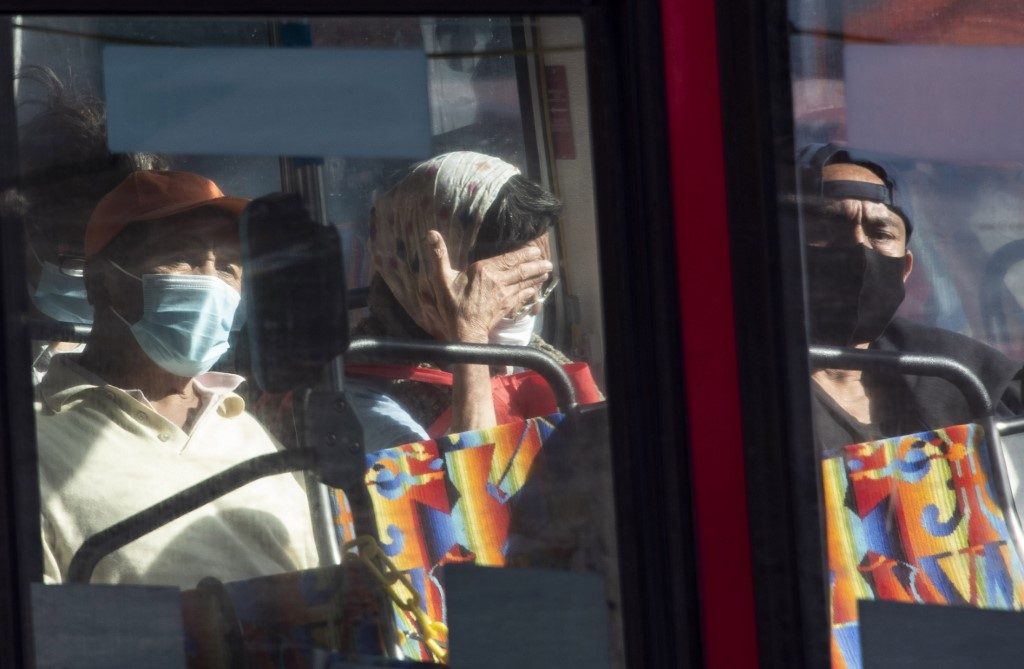SUMMARY
This is AI generated summarization, which may have errors. For context, always refer to the full article.

The World Health Organization’s chief called Monday, November 9, on everyone to keep fighting COVID-19, warning that while we may be sick of battling the pandemic, the virus is “not tired of us.”
Speaking to WHO’s main annual assembly, which resumed Monday after being cut short in May, Tedros Adhanom Ghebreyesus also hailed the election of Joe Biden as the next US president, voicing hope it could signal tighter global cooperation to end the pandemic.
It was vital, he said, for people to follow the science and resist the urge to turn a blind eye to the virus.
“We might be tired of COVID-19. But it is not tired of us,” he said.
Tedros, speaking from quarantine after coming in contact with someone who tested positive for COVID-19, warned that the virus preys on weakness.
“It preys on those in weaker health, but it preys on other weaknesses too: inequality, division, denial, wishful thinking and wilful ignorance,” he said.
“We cannot negotiate with it, nor close our eyes and hope it goes away.”
“It pays no heed to political rhetoric or conspiracy theories,” he said.
“Our only hope is science, solutions, and solidarity.”
His comment came after COVID-19 has killed more than 1.25 million people and infected over 50 million worldwide since it first surfaced in China late last year.
Tedros warned that the pandemic had laid bare the need for the world to recapture a “sense of common purpose”, which in recent years has been eroded by the “creeping tides of misguided nationalism and isolationism.”
“In that spirit, we congratulate President-elect Joe Biden and Vice President-elect Kamala Harris and we look forward to working with their administration very closely.”
Biden has signaled that his administration will reverse Donald Trump’s decision to withdraw the United States – traditionally WHO’s top donor – from the UN health agency.
“We need to reimagine leadership, built on mutual trust and mutual accountability, to end the pandemic and address the fundamental inequalities that lie at the root of so many of the world’s problems,” Tedros said.
Taiwan frozen out
Noticeably absent from this week’s resumed World Health Assembly (WHA) was Taiwan, which said Chinese “obstruction” had prevented it from attending and accused the WHO of prioritizing politics over health.
The self-ruled island of 23 million has seen remarkable success in combating the pandemic – with only 7 deaths and fewer than 600 confirmed cases.
But it is frozen out of the WHO by Beijing, which regards Taiwan as its own territory – not even allowed to participate as an observer as was the case between 2009 and 2016.
“As the world is still under serious threat of the COVID-19 pandemic…it is an irony to the ‘health for all’ goal under the WHO charter” to exclude Taiwan, Taipei’s foreign ministry said Monday.
The WHA will also focus on the more than 60 other health emergencies the WHO has responded to this year, including measles, Ebola, and yellow fever outbreaks.
It will be an occasion for countries to discuss reforming the WHO so it can respond to challenges like pandemics faster and more effectively.
Tedros called again for “a system in which countries agree to a regular and transparent process of peer review” of their health policies.
He said the Universal Periodic Review at the UN Human Rights Council, where each country’s rights situation is evaluated every few years, could serve as inspiration.
The idea was put forward last year by the Central African Republic and Benin, and France, Germany, and Cameroon have already accepted to work on this project, he added.
The issue of transparency in health policies is at the heart of the COVID-19 pandemic, with China accused by some countries including the United States of having covered up at least the first cases of coronavirus. – Rappler.com
Add a comment
How does this make you feel?

![[OPINION] A comprehensive global health network must include Taiwan](https://www.rappler.com/tachyon/2024/06/global-health-network-taiwan-june-7-2024.jpg?resize=257%2C257&crop_strategy=attention)



There are no comments yet. Add your comment to start the conversation.